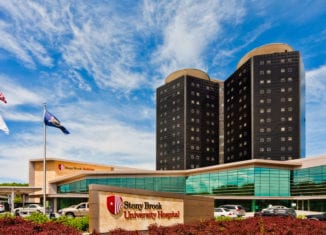Eye on Medicine: Transforming health care from Manhattan to Montauk
By Kenneth Kaushansky, M.D.
In a unique type of collaboration, Stony Brook Medicine and Mount Sinai Health System have entered into a formal affiliation agreement that combines the strengths of both organizations to create positive change in biomedicine, the delivery of care to our communities and the education of the next generation of health care professionals.
The affiliation of Stony Brook Medicine and Mount Sinai Health System is based on our common values, as well as a reverence for translating basic biomedical science into new cures for human disease and a commitment to providing health care professionals of the future the most advanced approaches to both didactic and experiential learning.
We also share the commitment to using robust clinical evidence to determine the very best medical practices that improve the quality of care delivered to our patients. Both institutions seek to apply our understanding of human health and disease to the entire population we serve, through our leadership positions in the New York State Delivery System Reform Incentive Payment (DSRIP) Program and other avenues, so that all will benefit from our efforts.
Often, when people hear the word “affiliation,” it is thought that there is a merger or acquisition; however, this is not the case — Mount Sinai is not buying Stony Brook or vice versa. It is an agreement that allows collaborative efforts to flourish and heighten academic, research and clinical care synergies.
This means boundless opportunities on a number of fronts. For example, the Stony Brook University School of Medicine and the Icahn School of Medicine at Mount Sinai will develop joint graduate and medical educational programs, maximizing the strengths of existing master’s and doctoral programs at each institution. Students will have the opportunity to take classes on both campuses, allowing them to learn new techniques and expand their exposure.
In addition, the combining of two research powerhouses has immense promise to influence both institution’s abilities to make major breakthroughs by moving discoveries made at the very basic level and bringing them to the bedside faster — all to improve diagnostics and treatments. We believe that the joint efforts will yield greater discoveries than would arise from either institution alone. Mount Sinai and Stony Brook have already taken steps in this direction by investing a combined total of $500,000 to introduce new research programs, with the intent of receiving collaborative external funding.
The areas of focus include biomedical engineering and computer science; drug discovery and medicinal chemistry sciences; neuroscience, neurology and psychiatry; basic biology and novel therapeutics; and public health and health systems. The alliance will capitalize on Mount Sinai’s strengths in biomedical and clinical research and health policy and outcomes and Stony Brook’s expertise not only in the School of Medicine but also in the College of Engineering and Applied Sciences, the College of Arts and Sciences and in departments such as mathematics, high-performance computing, imaging and the physical and chemical sciences.
It is a momentous time for academic medicine, health care, our respective students, faculty and staff and for the communities we serve across the Island and into Manhattan. The partnership allows both institutions to look at new ways to be innovative and bring the benefits of our shared transformation to our patients.
Dr. Kenneth Kaushansky is senior vice president of Health Sciences and dean of Stony Brook University School of Medicine.







